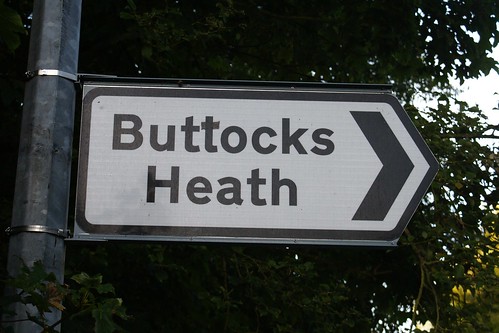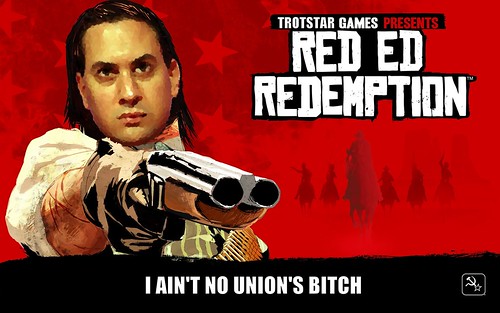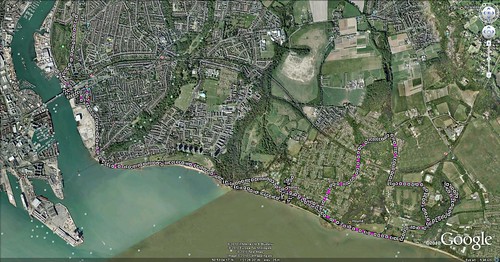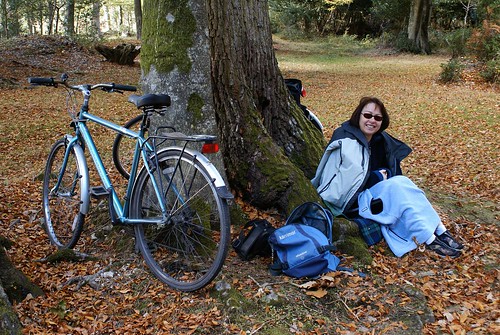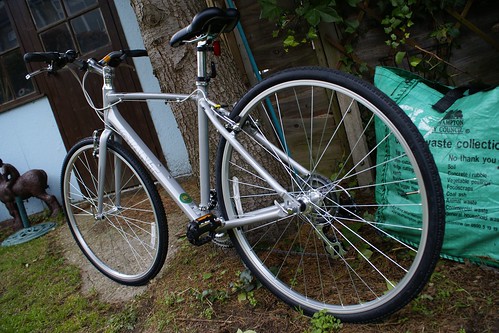I'm back in game-reviewing mode with another birthday present, the Africa-set
FPS Far Cry 2 (
FC2), an ostensible sequel to the 2004 shooter
Far Cry. There, the player took on enhanced mutant soldiers in a beautifully-rendered tropical paradise; here, the player takes on a task involving a
failed state and
blood diamonds, subjects more familiar from the evening news than from science fiction.
Set within a war-torn African state on the verge of complete collapse,
FC2 sends the player to catch up with, and then eliminate, an arms dealer known as the Jackal. By supplying both sides in the conflict with weapons, the Jackal has greatly displeased the player's employers, who just want to get on with the job of bleeding the country dry. However, the player's first catch of the day is
malaria, which leaves him incapacitated and defenceless in his hotel room. Fortunately, the Jackal is mysteriously at hand to medicate the player, and save him from an ongoing (and curiously simultaneous) gun battle in the town, before disappearing off once more.

Back on his feet, but still needing the occasional dose of anti-malarial drugs, the player finds himself between two opposing paramilitary factions, both eager to eliminate the other and take the spoils of the country, oil and blood diamonds, for themselves. Along with a number of other foreign national NPCs, who can be buddied up with, the player then takes the role of a mercenary, ultimately working for both sides on a succession of missions. These usually involve a long journey, by road or river, through hostile territory (= the whole game map), followed by an intense period of combat during which something, or someone, is stolen, destroyed or assassinated. The reward for mission completion is payment in blood diamonds, which can then be used to buy better weapons, equipment and training. Missions need not be followed to the letter, and the player's buddies frequently interject alternative completion pathways that net better rewards and strengthen buddy "history".

Alongside missions for the warring factions, the player can also undertake slightly more humanitarian tasks, such as transporting passports to innocent bystanders trying to flee the country, and helping a journalist recover incriminating audio recordings of the Jackal. Needless to say, there are also
GTA-style assassination missions handed out by a mysterious stranger at the end of a phone line, though these pay in diamonds rather than malaria medicine or hearty thanks. And, along the way, the Jackal occasionally drops in on the player to offer advice or help. Odd behaviour indeed for someone the player is supposed to be "taking care of", but then the Jackal isn't quite what he appears, and he needs someone fresh off the plane to help him achieve his goals against an army of parasitic mercs.
First of all, the woefully misnamed
FC2 (which has nothing whatsoever to do with
Far Cry) is a lot of fun to play, and I really enjoyed the time I spent shooting my way through its various obstacles. However, the developers of
FC2 have fallen into the classic trap of focusing on technical aspects of the game and neglecting the story till the last minute. In terms of how it looks, sounds and "feels", the African setting of
FC2 is beautifully well-realised, with great jungle, savannah and desert settings, and impressive attention to detail on architecture and interiors. The combat dynamics are similarly well-honed, with (relatively) smart enemies that fight, track and ambush the player convincingly, and with the novel addition of fast-spreading fire that opens up unique battlefield opportunities. All these bits are great, but the realism that they bring evaporates when they're practically crippled by the story that's bolted onto them.
To be fair, the story
tries to reach beyond the clichés that are the
de facto standard in gaming. For instance, rather than posit (cf.
Just Cause) a morally unambiguous "black hat" for the player to hunt down and "
terminate with extreme prejudice",
FC2's target-cum-antagonist saves the player's life at the start of the game, and pops up from time to time in a manner that suggests (in the clunkiest manner possible) that perhaps he's wearing a grey hat. This isn't a bad premise for a game (and something like it is what I'd hoped
Just Cause would try for), but it's more or less the whole of the story. The rest of the game is simply a series of unconnected missions and events that, while a lot of fun, are completely incoherent.
While I began the game worrying about the consequences of my actions (cf. the sublime
Fallout 3), it quickly became clear that, beyond the end of the current mission, there were none. Further, if I didn't complete the requested theft / armed assault / assassination, I'd simply not see the rest of the game. That was a tolerable mechanic in earlier games (
GTA IV being about the last of them), but now it makes for an air of non-realism that can't be offset by immaculately realistic game physics. Similarly, the lack of any friendly faces in
FC2. While the player ostensibly works for one (or other; or both) of the two factions, this seemingly counts for nothing in the game, where every checkpoint or patrol encountered immediately starts shooting. This is explained away in dialogue as a consequence of your missions being covert, but I recognise lazy game mechanics when I see them. Friendly AI is more difficult to write than its hostile equivalent, so the developers have simply avoided including any.
Games like
Half-Life 2 dodge the problem of moral complexity by dropping the player into a storyline where it's completely credible that almost everyone you meet is a black hat, so the possibility of moral choice is avoided. Here, the designers aspire to creating a morally intriguing story, but then immediately forget about this while they create a game in which
everyone wants to kill you regardless of your actions, and in which the game doesn't care two hoots how you clear the next checkpoint (
i.e. killing everyone, or not). The net result of this is that neither the game nor the player have any investment in how things play out morally. Which leaves the loftier ambitions that
FC2's writers clearly had for the narrative twisting in the wind. Even
GTA IV, for all its forcing of the player's hands, included a large numbers of bystanders that the player could either deliberately mow down (with consequences), be indifferent toward or drive carefully around.
Whew. All that said, I return to my initial point that I generally enjoyed
FC2. If one ignores the storyline, there's a lot of fun to be had with the various, and varied, missions. As already mentioned above, combat is pretty good here, though I did find that, on the
normal setting and with a few good guns, I was more than a match for my enemies. Certainly, the difficulty of missions could usually be significantly decreased through the possession of both a sniper rifle and some distance from enemy mercenaries. But against enemies with good AI, and the really neat inclusion of spreading fire, combat (somewhat) offsets my complaints above.
I also really liked some of
FC2's little touches like the impromptu battlefield surgery the player performs on himself, the occasional malarial meltdowns and the fact that my player character, unusually for a FPS, actually had a body attached to his viewpoint. And, to return to another earlier point, I absolutely
loved the African setting. Aesthetically, it's top-notch, and really very beautiful in places (unlike, say,
Fallout 3's ruined Washington DC); and it's also quite a welcome change for a games developer to attempt a quasi-realistic developing world setting. It doesn't come close to making the most of this because of its narrative limitations, but it's definitely at least one step in a more interesting direction for FPS.
Overall, pity the game that follows in the long shadow of
Fallout 3.










